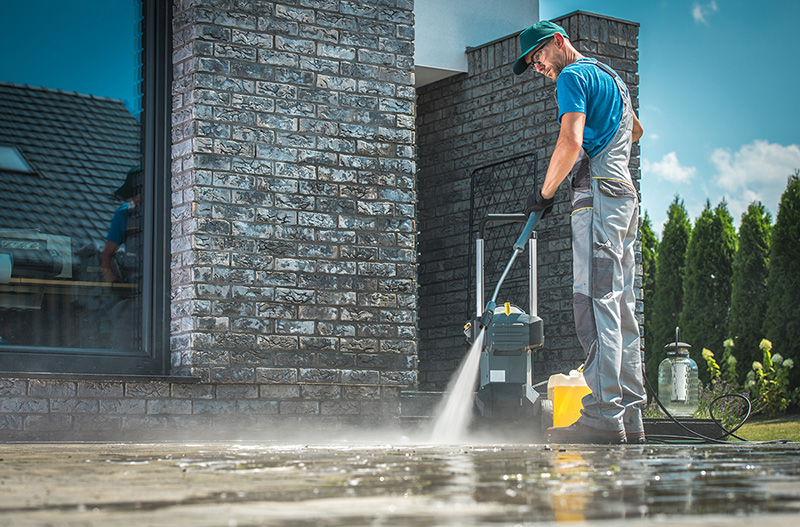
A pressure washer is one of the most valuable tools for cleaning equipment, driveways, construction sites, and heavy machinery. But if you notice water pooling where it shouldn’t, a leak can quickly turn a reliable machine into a frustrating problem.
Why pressure washer leaks matter
Leaks aren’t just messy, they reduce water pressure, waste energy, and can damage internal components. A small drip today may turn into a major failure tomorrow if ignored. Even more importantly, leaks can create serious safety hazards, including slip-and-fall risks, electrical dangers if water meets cords or outlets, and possible chemical exposure if detergents or cleaners are in use. Understanding what causes leaks is the first step toward safe, reliable, and efficient operation.
At Royal Brass and Hose, we carry a full range of pressure washer accessories designed to keep your system performing at its best:
- Connectors – Reliable quick-connect fittings to stop leaks at the source.
- Nozzles – Choose the right spray pattern and pressure for each job.
- Lances – Extend your reach and clean more effectively without strain.
- Strainers – Protect your washer from dirt, sand, and debris that wear down seals.
- Spray Guns – Replace leaking or worn trigger guns with durable, commercial-grade options.
- Assortments – Stock up on replacement parts so you’re always ready for quick fixes.
Worn or damaged O-rings and seals
Cause: O-rings and seals are small but critical parts of your pressure washer. They sit inside hose connections, spray wands, and pump fittings to keep water contained. Age is one factor in why they fail, but there are many others. Hard water buildup, aggressive detergents that exceed chemical resistance, and even improper chemical use can cause seals to deteriorate. In addition, worn or damaged connectors and dirty, poorly maintained fittings allow dirt and sand to grind against the seals, acting like sandpaper and accelerating wear. Over time, these issues can cause O-rings to crack, flatten, or fail altogether.
Solution: Replacing worn O-rings and seals is the quickest fix, but prevention goes a long way. Start by keeping hose ends, spray wands, and pump fittings clean, dirt and sand are highly abrasive and can chew through seals fast. Use detergents that are compatible with your equipment’s chemical resistance ratings and avoid overly aggressive cleaners that accelerate breakdown. Inspect connectors regularly for wear or cracks and replace damaged ones before they cause leaks. Finally, store your pressure washer in a dry, clean area to prevent hard water deposits and environmental damage. Keeping connectors maintained and using the right chemicals can significantly extend the life of your O-rings and seals.
Loose or faulty hose connections
Cause: High-pressure water flow puts stress on hose fittings. If connections loosen or threads wear down, water can escape.
Solution: Tighten hose connections before every use. If the leak persists, check for stripped threads or worn couplers. Upgrading to quality quick-connect couplings can make a big difference in durability and ease of use.
Cracked or worn hoses
Cause: Pressure washer hoses are constantly exposed to extreme pressure, bending, and sometimes chemicals. Over time, small cracks develop, leading to leaks and even bursts.
Solution: Replace damaged hoses immediately. For heavy use, choose a reinforced high-pressure hose designed for durability. Proper storage, coiling hoses loosely and keeping them out of direct sunlight, also extends their life.
Pump wear or seal failure
Cause: The pump is the heart of your pressure washer. If its internal seals fail, water can leak around the pump housing. Lack of maintenance, dirty water, or high hours of operation can accelerate this problem.
Solution: Pump repairs and replacements are typically handled at the equipment level through the manufacturer or a service shop. While Royal Brass and Hose does not supply pumps or internal repair kits, we do provide accessories, hoses, connectors, and strainers, that help protect your pump from excess wear and keep your washer operating at peak efficiency.
Trigger gun leaks
Cause: A worn trigger gun can develop internal leaks, especially around seals and valves. You might notice water dripping even when the gun is not in use.
Solution: Replace the trigger gun if leaks persist after seal replacement. Choosing a commercial-grade spray gun helps ensure longer life in demanding applications.
If a worn trigger gun continues to leak, replacing the gun, and ensuring you’re using the correct nozzle size, is essential. Learn how to select a replacement nozzle.
Preventing pressure washer leaks
- Inspect before every use: Look for drips, loose fittings, or hose damage.
- Use proper storage: Protect hoses and seals from sun, heat, and freezing temperatures.
- Perform regular maintenance: Replace seals, check oil levels, and flush the system as recommended.
- Invest in quality parts: Cheap hoses and fittings wear out quickly. Upgrading to professional-grade parts reduces leaks and downtime.
Keep your equipment running strong with Royal Brass and Hose
Whether you’re a homeowner or a contractor, upgrading accessories is often the fastest way to solve common leak problems and extend the life of your equipment. Contact us or visit one of our locations to learn more.
